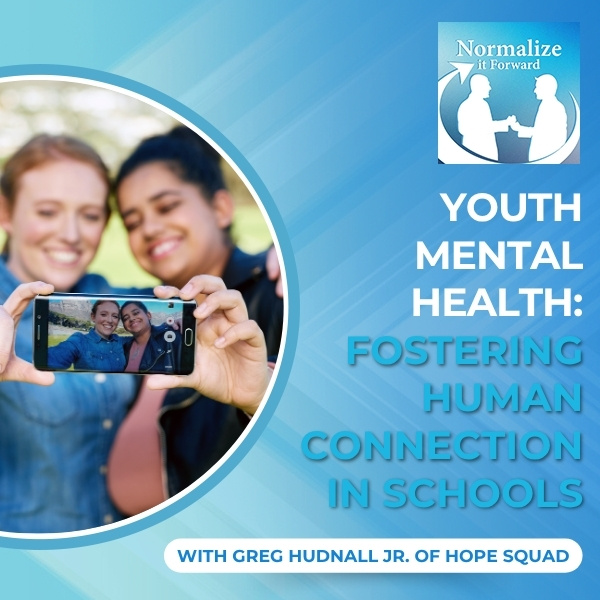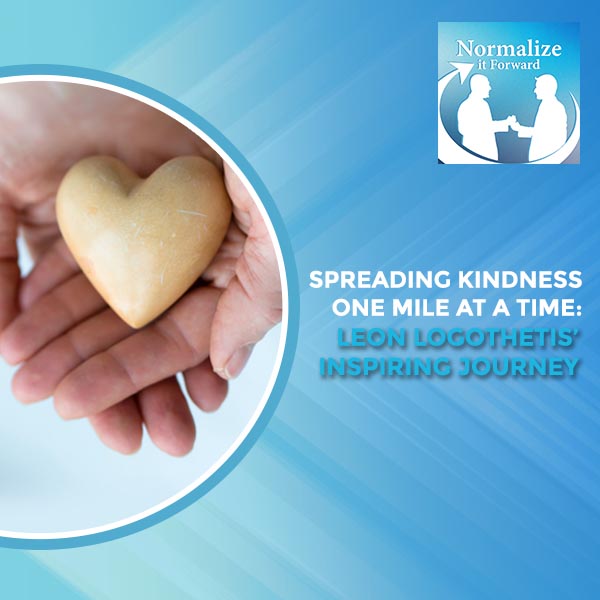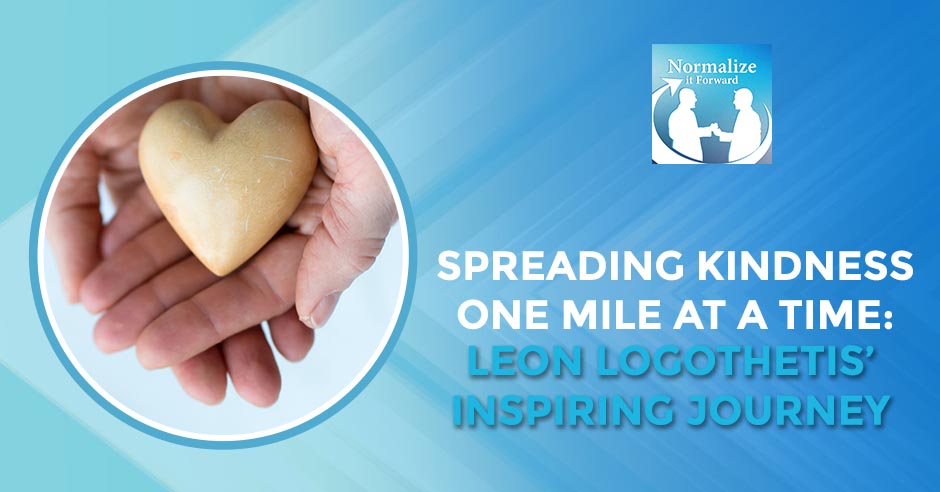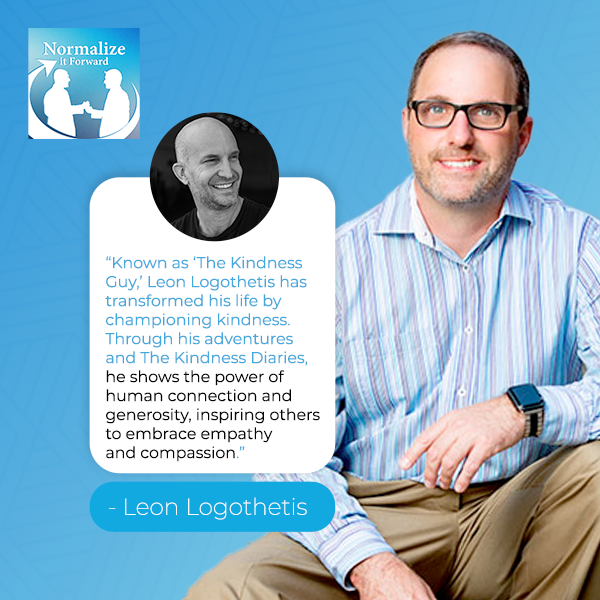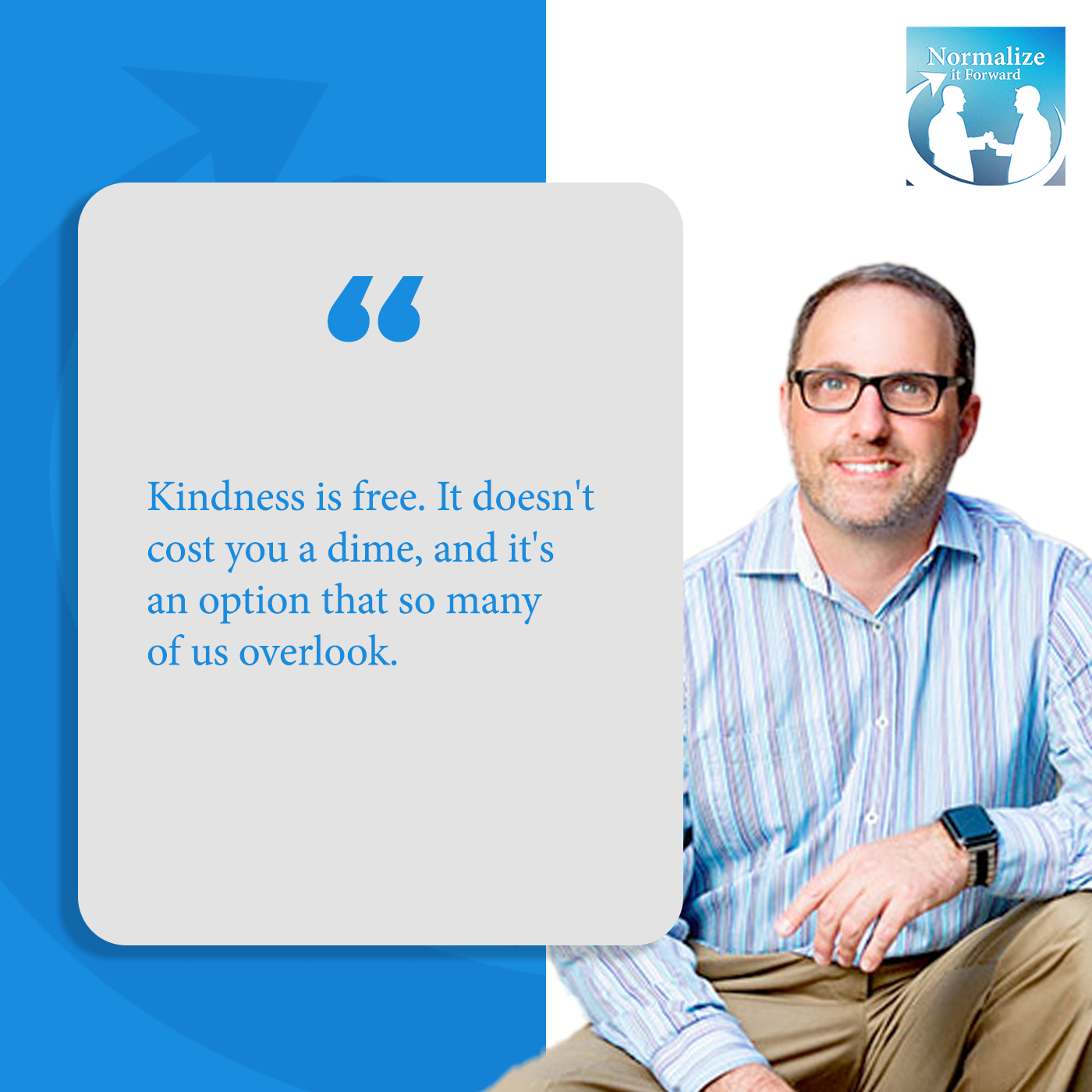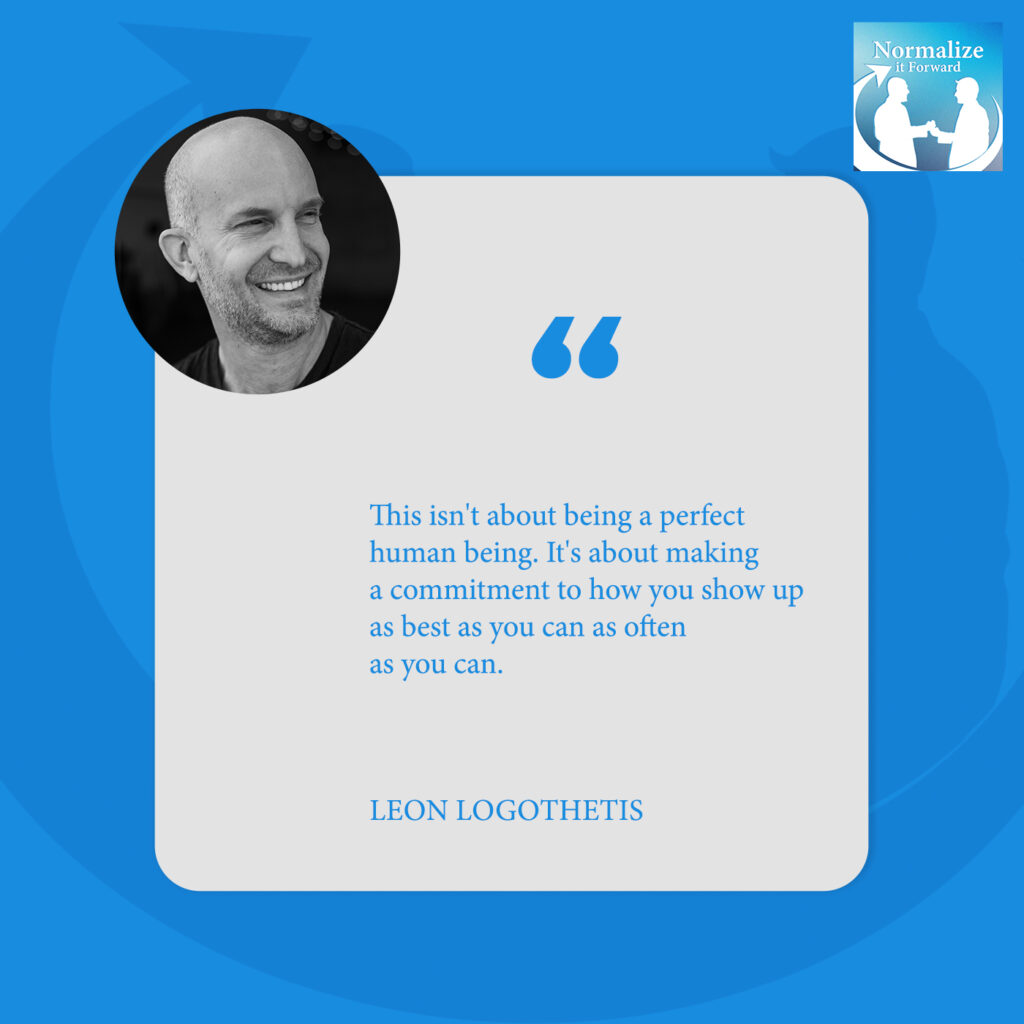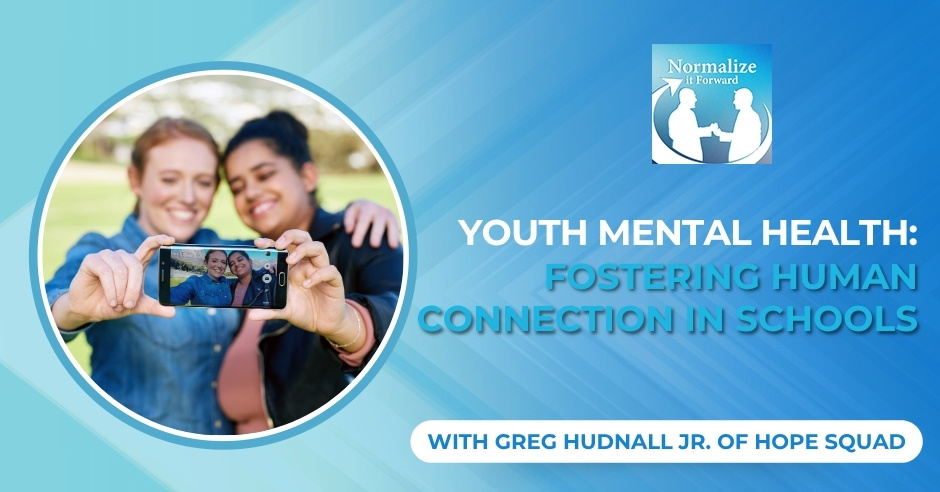
Fostering human connection and hope within schools is a vital step in addressing youth mental health. In this insightful episode, we delve into this critical topic with Greg Hudnall Jr., CEO of Hope Squad. We learn about Hope Squad’s innovative approach to empowering students to become active listeners and supportive peers, helping to normalize conversations around mental health and provide crucial connections. Greg shares his unique journey from corporate America to leading Hope Squad, inspired by his father’s dedication to suicide prevention, and discusses the alarming statistics surrounding youth suicide and mental health challenges. This conversation sheds light on the importance of peer-to-peer support, emotional awareness, and the need for communities to recognize and address mental health issues proactively. Greg also provides valuable resources, including HopeSquad.com, for schools and parents seeking to implement effective mental health support systems.
Reading about mental health is hard. Let’s schedule a free consultation.
—
Watch the episode here
Listen to the podcast here
Youth Mental Health: Fostering Human Connection In Schools With Greg Hudnall Jr. Of Hope Squad
We are joined by Greg Hudnall Jr. of Hope Squad. Greg, welcome to the program.
Thanks.
A bit about your background, Greg is the Chief Executive Officer at Hope Squad. By background, he spent a decade in corporate America at Kroger Co. and Johnson & Johnson in process improvement, marketing, and sales. Greg firmly believes that good personal mental health habits, active listening, and reaching out to trusted peers have the ability to save lives. When he is not at work, he enjoys hiking, exercising, and reading. A fun fact is that he has climbed 15 of Colorado’s 58 fourteeners. He’s been to 5 continents and lived in 4 different countries. His next bucket list item is Mount Kilimanjaro. Greg, welcome. How are you?
I’m good. Thanks. I’m looking forward to the conversation.
From Corporate To Compassion: The Birth Of Hope Squad
Tell us a little bit about Hope Squad.
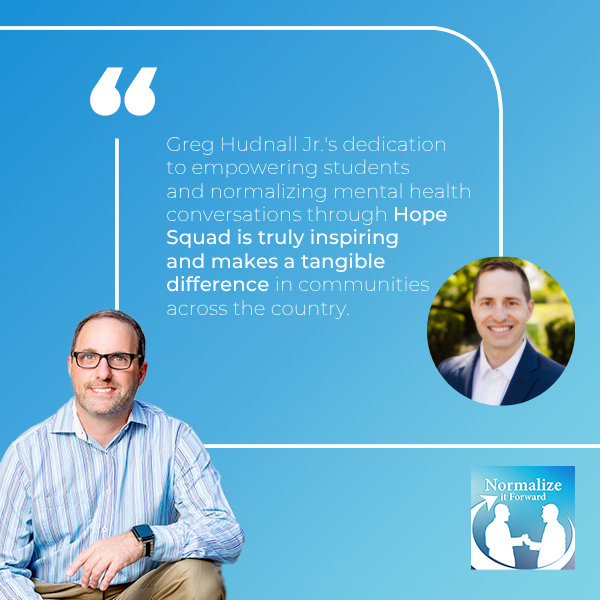
Hope Squad is a company. We say that we exist in order to foster human connection, community, and hope. We exist in order to help in that connection. We believe connections have the power to change lives. We exist as an organization. We work within a couple of thousand schools across the country. We help implement what we call the Hope Squad model and the Hope Squad Way, which is taking the peers that are nominated by their peers inside of a school and putting them together with some certified advisor or certified adults that Hope Squad certifies.
We have them work week after week and month after month of a school year in order to help exactly what your show says, normalize the conversation around mental health, and then be that active listening ear for their peers, notice dysregulation or things that perhaps are a little out of the ordinary, and to put their arm around their friends and peers and say, “Can we talk? There’s something going on in your life. What can I do to help?”
What a great concept. I love it. Having worked in the schools my whole career, both private and public at varying levels, what a great concept to bring to a school system and help kids understand mental health and help them understand their role around their peers. That’s fantastic. How long have you been with the company?
I’ve been with Hope Squad full-time for about a year and a half.
Peer Power: Normalizing Mental Health In Schools
I couldn’t help but notice you made a bit of a jump from corporate America to Hope Squad. I’m wondering what’s behind that.
Hope Squad started as an idea by my dad many years ago when my dad was in public education. He worked in public education for 30 years. He was a high school principal, and then he worked at the district office. He lost a couple of students to death by suicide. As a high school principal, he recognized the opportunity that the school system could and should do more.
When he was at the district office, he talked about making a change and trained as many adults in the school system and in the community as he could, and it didn’t impact the death by suicides. They realized something needed to be different and something needed to change. That something was focusing on the peer-to-peer component and the peer-to-peer power. We know that kids are more likely to talk to a peer than they are to an adult. That is what they’re hardwired to do at those ages, especially middle school and high school. As they do so, we want to make sure that the kids they’re talking to are the ones who are empowered and knowledgeable. They have the tools and resources in order to do so.
Kids are more likely to talk to a peer than they are to an adult. Share on XThat’s what my dad was trying to do many years ago. He worked on that when he retired from the school district, and continued to work on that inside Utah. He set up an organization, Hope Squad, in order to help take that to the country and to the world. I was ancillary involved prior to joining full-time. My dad has since retired and provided the opportunity to help take this to thousands of more schools across the country.
Youth Mental Health Crisis: Unveiling The Stark Statistics
What a fantastic concept. I want to back out for a minute and update the parents who are reading. I wonder sometimes as a therapist. You’re in the mental health space. We might take for granted that parents realize how bad an issue this is. I want to throw out a few statistics to illustrate it. First of all, I work with young adults, mostly high school and college-aged. In that age bracket, suicide is the second leading cause of death. To give parents a sense, that has climbed from number 12 to number 2. Anxiety and depressive symptoms are through the roof. They’re as high as I’ve seen in my entire career, both with high school and college students.
It’s unfortunate, but in my area here in Connecticut, I have come across four different scenarios where individuals have taken their own lives. It’s tragic. It’s so sad. There’s such a ripple effect that occurs. I’ve had students of mine tell me about another student that they don’t know too well, but they’re a contemporary of theirs. They hear these stories, and it’s triggering and disturbing for young people.
That doesn’t go away after a week or two. As adults, we think, “They’re back. They’re settled. They’re in their routine,” but it’s a big issue, as far as I can tell, in most communities that have been touched by this. I appreciate so deeply what you guys are doing. My guess is there are a lot of schools out there and a lot of parents out there who would want to get in touch. How do they do that? How do they get in touch with Hope Squad?
The easiest way is to go to our website, HopeSquad.com. There’s a big button right on HopeSquad.com in order to connect. We ask for a little bit of information, including your name and email, in order for us to be able to reach back out and start that conversation about what it looks like. You read a little bit about my background. Maybe it’s my stats degree that pulls at me, but I do want to hit on something.
The CDC does a regular Youth Risk Behavior Survey. I want to point out results from 2023, the same news and trends that you’re talking about, that perhaps put this in stark numbers for our readers out there about what we talk about. The Youth Behavior Risk Survey from the CDC said that 40% of high school kids reported feeling persistent sadness or hopelessness, and then their number is that 10% of kids attempted suicide.
When you look at a classroom of 30 kids, it’s 3 kids. Three kids in any given classroom across the United States had attempted to die by suicide. In almost any age group, from youth, suicide is one of the leading causes of death. These are the numbers that we’re dealing with as communities, as families, and as parents that we have to grapple with on a daily basis.
I’ll be honest. I’m 51. I would guess a lot of parents think, “That’s not happening in our town or in our community.” Yet, it is. There are statistics to prove it. There are examples to prove it, unfortunately. I wonder. What are your thoughts when you hear a parent respond in the manner of, “This could never happen here.”
It’s a tough conversation for the times that we talk with parents and families who have lost a child or a family member to suicide. The truth of it is that a lot of the time, we’ll hear from parents, “I couldn’t believe that it was happening to us.” In any tragic part of our life, when that moment, which can be avoided in many cases, comes to us, we often don’t know what to do. It’s that side of us that’s saying, “I can’t believe that this could happen to us.”
Being perhaps the data nerd that I am, looking at this from that side would be an attempt to say that it does happen in every society, and it does happen in every community across the United States. Being blind to it, perhaps, isn’t going to make the problem go away by not being able to talk about it. One of the reasons I love the name of your show is that we’re doing exactly that. We’re normalizing the conversation around mental health.
The CDC reported data is something that I hope we can attempt not to ignore. The reason we talk about it and plaster it everywhere is so we can start the conversation around how this data exists for kids. At the end of the day, it’s three kids that I care about more than the data of 1 out of 10 or the 3 out of 30 in this classroom. What I care about is those three kids and what they are feeling. Do they have a friend to go to and talk to? Do they have someone to talk to?
As Hope Squad, what we want to do is try to empower those kids, those schools, and those communities in order to have those conversations, and then, when and as needed or when appropriate, they’re elevating that to the likes of therapists and psychologists across the country. The system as a whole, we know, struggles in terms of having the resources to meet the needs. Not every clinical approach is going to help. Often, what we’re trying to do is at that grassroots level of having a peer and sitting down next to somebody, talking, having the conversation, and reaching out.
It’s so important. It’s interesting. I’ve been doing what I do for a while, and the show is fairly new to me. I enjoy learning and getting a different point of view from people. In one of my interviews, we were talking about the show A Million Little Things. I’m not sure if you’re familiar with the show. It’s one of my favorites. I was talking to the executive producer. He had asked me a question about what resonated with me.
It got me thinking about a scene in the first show when an individual was in the middle of trying to kill themselves. He had a mouthful of pills. Something tragic happened to a friend at the same time, and he spit them out. What got me about that scene was that for several episodes, he never told anybody. Here he is, looking to end his life, and he is holding this secret.
I can’t begin to tell you how many young people have come into my office over the years and told me something similar. When I ask them the question, “Who knows about this?” The answer’s always the same, which is, “You’re the only person.” I want parents to understand from this conversation as much as possible that there is a secretive nature to all of this.
Kids, even if they haven’t told you they’re struggling, they very well might be. The statistics show that many kids do. It becomes important to try to figure out a way to access those conversations. Your organization, through peers, does a great job of making that happen. I wanted to shift and ask you a little bit about the why. Why are these numbers so off the charts? Why are they so extreme? In your opinion, why have they gone in that direction in the last couple of years?
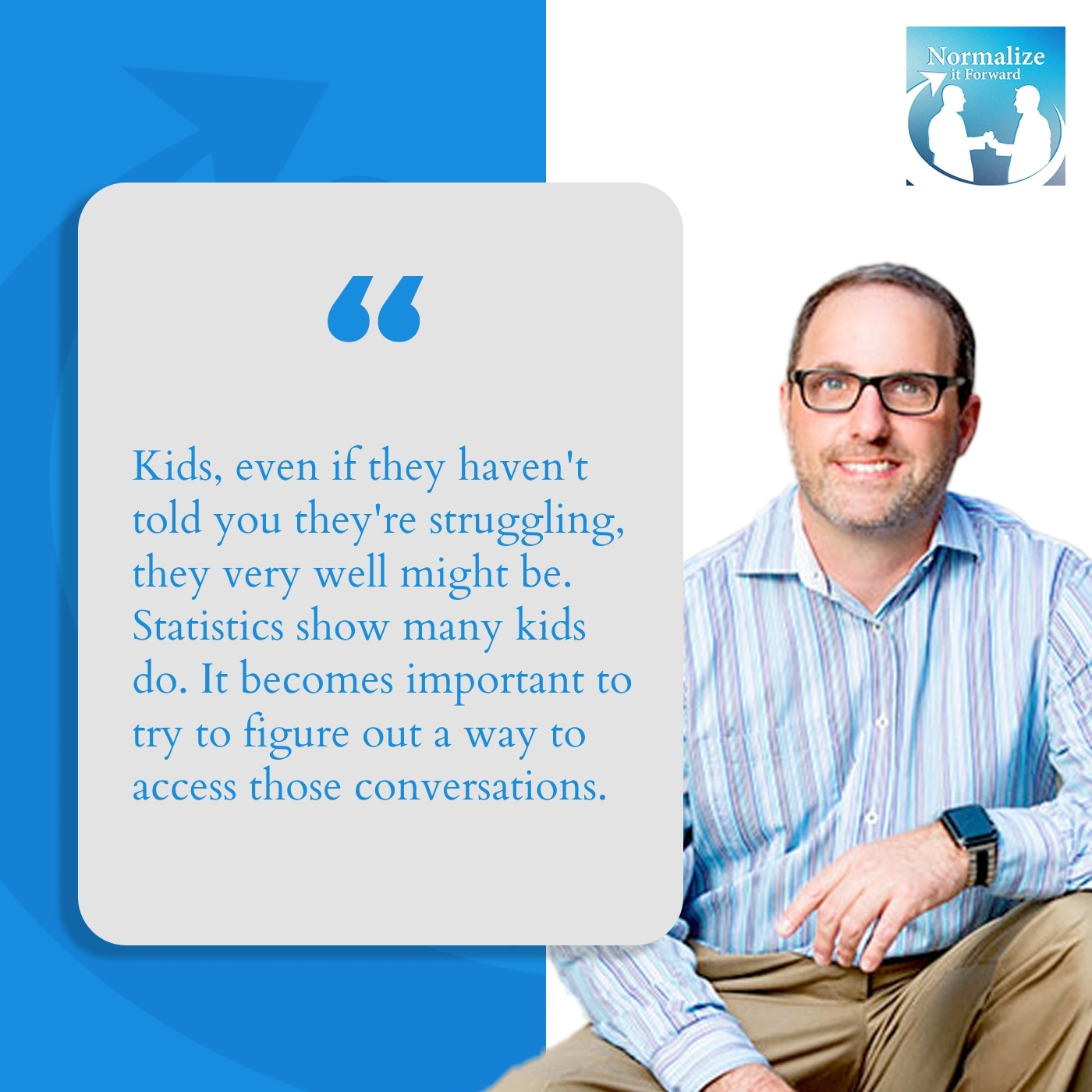
Digital Disconnect: Social Media’s Impact On Youth Wellbeing
I’m no social scientist, so why is a tough answer for causation. Perhaps I’ll speak a little bit from correlation. I don’t know the full reason of the why. I’m sure it’s multifaceted. I’m positive of that fact. I do think that as we continue to live our lives around cell phones and away from the connection that we used to get, that helps drive perhaps feelings of isolation. We’ve never been more connected in a digital space, and we’ve never been more unconnected in a friendship or a relationship in a tangible way. That’s part of it. It’s one that’s concerning to me.
I have little kids. I think about Jonathan Haidt’s The Anxious Generation and the way that I want to try to approach my kids growing up with their access to social media, for example. I am not saying that the internet or cell phones are bad, but what are the tools and the way that we use them? Are we protecting our kids too much from the physical world and not enough from the digital world? How do we have a healthy balance from that?
As parents, we have the opportunity to look around and make sure that our kids are getting the connection that they need at those ages that we’ve talked about, middle school and high school. At the end of elementary, they’re hardwired to look to their peers for that connection. What is the way that they’re getting the connection? What is the way that we, as parents, are fostering that connection for these kids?
That’s very well said. There have been a lot more, on the principal level, restrictions on phones during the day in middle schools and high schools, which is great. I’ve seen many more kids with their heads up, walking in hallways and on campuses in 2025 maybe than I have in the last many years as a result of that. That’s not to be underestimated. That connection and that ability to have a conversation have a direct impact on the isolation many kids have felt over the years. It’s important for parents to understand that impact. I always say social media is like having a swimming pool. It can be a lot of fun, but you have to respect the hazardous side as well.
That’s a good analogy.
There clearly is a hazardous side. There are a lot of things out there. Honestly, the show became something I wanted to develop mostly because of these types of conversations that I feel like can help parents parent their kids and help them understand. There isn’t a playbook here, but there are plenty of resources out there, you being one of them and your organization being one of them, to help guide a sense of, “You may not have a lot of contact with depression, anxiety, or suicide, but know it’s out there. Know that even if your kids aren’t struggling, they’re around people who are struggling, and that can have an impact as well.”
Great point. The comment that I’ll make is you’re right. Some of those kids are going to be the ones who get nominated to a Hope Squad. They’re the ones who are the resource that other kids come to. One of the reasons we say that Hope Squad works so well in any community and any environment is that it’s not the adults who are choosing the Hope Squad members. It’s the peers, so it’s meant to be reflective of your community. It’s meant to be reflective of the community that it’s in.
We've never been more connected in a digital space, and we've never been more unconnected in a friendship or a relationship in a tangible way. Share on XIt is having a voice of that band student, that football player, or whoever it is that gets nominated to the Hope Squad because they’re a good listener. They’re the ones who then sit all year long with the trained advisor. They’re working on the content, the warning signs, and risk factors of suicide, and then are like, “How do I do a better job of recognizing disconnection? How do I practice reaching out to somebody? How do I overcome my own fear, put down my own phone, reach out to somebody that I haven’t seen for a couple of days or that looks maybe a little bit different than they normally do, ask a question, and make a connection?”
That’s so fantastic, the way in which you guys created this, going at it from a kid’s perspective and understanding. I was thinking, as you were talking, of the social hierarchy that a lot of schools have. There are a lot of peer opportunities in schools, but this cuts through all of that in a way that everybody is available to do this. It’s not so much about a need. It’s more about a want, and which of you kids wants to participate, learn these skills, grow, and feel like you’re helping or assisting in some way?
To be honest, Greg, most kids need that. When I say to kids, “Have you known somebody who has either taken their life or tried to take their life?” They do. Most kids have a list of kids. They’re living amongst that. They’re living in this world. It makes being a kid hard, in some ways. To flip it back to us as parents, it makes parenting those kids challenging as well.
Let me ask you a little bit more about parenting. You touched on social media. There’s so much around the dos and don’ts, if you will, of parenting and what we ought to be looking at versus what some parents are looking at. I’m wondering. Your organization must have a decent amount of contact with parents. Do you tend to get lots of support from parents or lots of parents not supporting you? What kind of feedback do you typically get from the parenting point of view?
First off, I’ll say that to be a Hope Squad member, you have to have a signed parent permission form. Any Hope Squad member in the entire country, every single year, has to return a signed parent permission slip. That’s the bar. At a minimum, parents are aware and are allowing their child to participate in Hope Squad. That’s number one.
Number two, it’s amazing the positive impact we get from parents. Once parents understand what we’re trying to do and the positive impact that it makes on their child and the school community, we have such a positive response from parents. If parents go to our website, they’ll see a video from a lady who is a Hope Squad mom and considers herself a Hope Squad mom. She starts out the video by saying, “Some parents are parents of band kids, and some parents are sports parents. We’re a Hope Squad family. We’re Hope Squad parents.”
Their kids all independently got nominated to be a part of the Hope Squad. She said it was a culture that they fostered within their home to make sure that their kids were reaching out and being aware of other kids. As she talks about that video, that is reflective of the majority of parents out there in response to their interaction with Hope Squad.
One thing we’ll notice is that as Hope squad members grow up, graduate high school, and move on to other parts, we’ll have them reaching out to us in later years in college and thereafter. You see that that influence extends far beyond school. I’m sure those parents, in the same exact way, are appreciative of the way that Hope Squad is providing beneficial mental health awareness, at the very least, to these kids long-term.
The hope is for kids who participate in Hope Squad or other great groups out there to become self-aware of their own emotions, so that they can take those moments to pause. Share on XI love that. That’s fantastic. What a great culture to lay down for kids. The impact of that, honestly, you guys may not even necessarily know or hear about, but my guess is it develops exponentially in some ways in the future.
We hope so.
Empowering Emotions: Preparing Teens For College Transition
Let me ask you about one other question. As a therapist, I see a lot of high school kids late in high school transitioning to college. I’m wondering about your perspective on mental health and wellness, in general, of that population of kids.
Through the transition from high school to college?
Yeah.
It’s perhaps more pronounced, but almost no different than that change we see, especially if they change campuses. For a kid going from elementary school to middle school or middle school to high school, there’s a lot of that big change that happens. What I’m hoping is that kids who participate in Hope Squad or other great groups out there in a similar way are becoming self-aware of their own emotions, so that they can take those moments to pause.
When I was in school, we certainly didn’t talk about self-care. We certainly didn’t talk about mental and emotional awareness to the degree that we do. What I would think about with these kids is making sure that they are able to articulate their feelings. Brené Brown’s book came out with 83 or 85 different emotions. It takes me looking at those on a page in order to be able to articulate what those are.
There’s the opportunity as someone graduating from high school and going to college, and that fear or anxiety as you set yourself up in a new dorm room for the very first time. As parents, we look at that and we think, “This is a great opportunity. Look at all the great memories that I have.” Sometimes, we perhaps overlook and forget the anxiety that we had ourselves on that first day, settling into a new dorm room with new roommates, etc.
We are helping to normalize, which is the name of your show, the feelings that they’re having so that they can understand, “Feelings don’t own me and don’t control me. I get to decide what I do, but I’m going to recognize this feeling for what it is. At this moment, it’s perhaps a little fear, perhaps a little anxiety, or whatever it is. We can talk through it.”
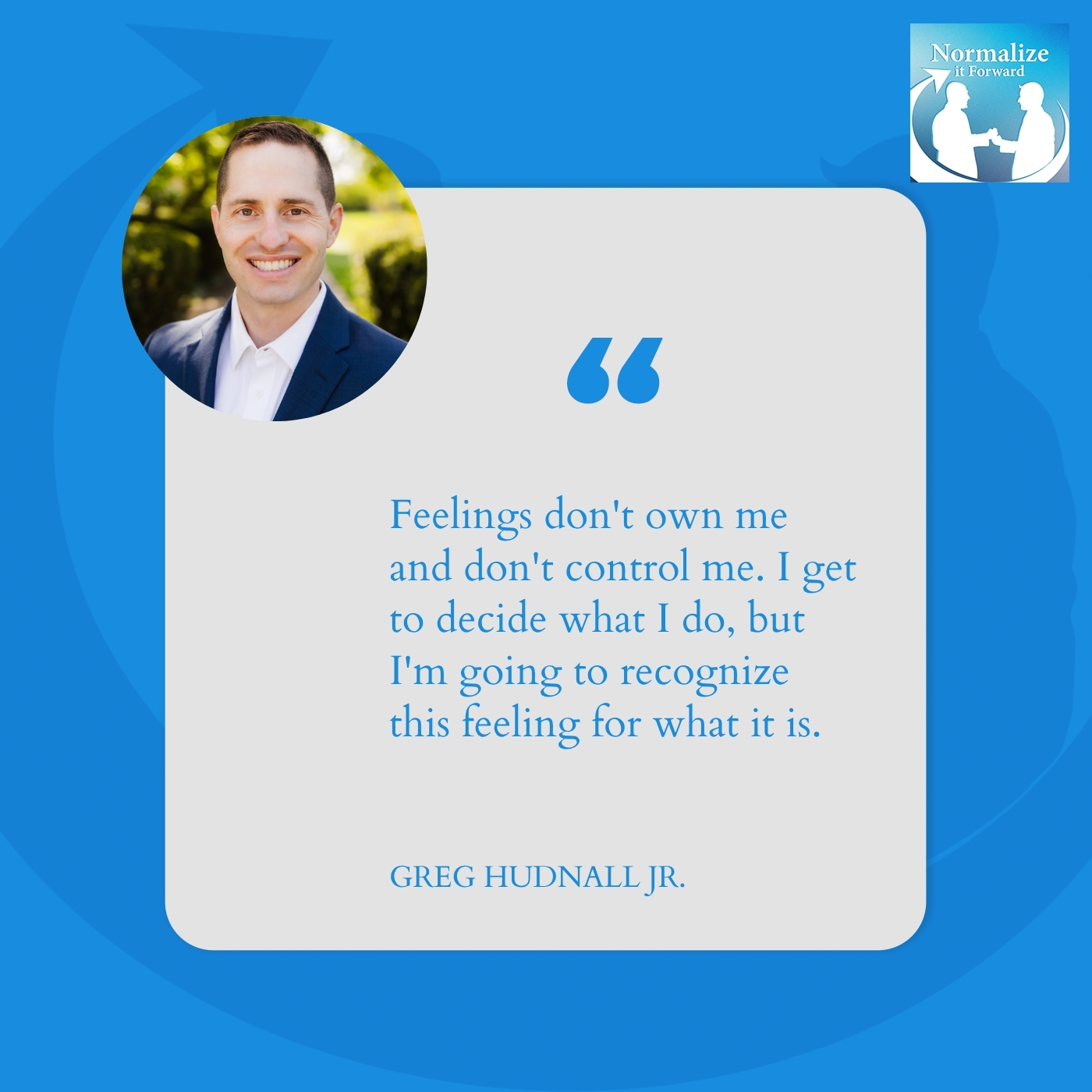
There are so many great points there, and I want to pull one out. At the very least, one of the things your organization does and does well is helping kids understand their emotions. Feeling an emotion is one thing. Acting on it is another. We all have felt fear. We all have felt frustration, stress, anxiety, and all of those things. Sometimes, kids will be paralyzed by those feelings. Others will see them coming and be able to take steps to shift away from it.
At the very least, we need to be aware, know that it’s there, and recognize that those are things that can have a major impact on us. I appreciate the thrust of what your organization does because, in many ways, the solution to helping reduce so many of these numbers and these statistics starts with this. It starts with that awareness.
That’s why we also operate in elementary schools with the primary purpose of trying to teach around that awareness of emotions.I have a 5-year-old. What better time to help kids to help them understand and then ask. When they’re in a moment when they need to ask for help in recognizing their own feelings, either they need a moment in the quiet corner or they need to ask for help with an emotion, what better time for someone to learn than in elementary school before they get to middle school or high school and they haven’t developed those skills?
They don’t know when to ask for help. They are reaching for other things, like cutting and something else, that perhaps is the less productive form of asking for help or reaching out for help. One of our main focuses and goals is trying to reach more kids in the elementary space for exactly this reason. They’re normalizing that conversation around mental health and mental well-being in the elementary level as they grow up in middle school and high school, and then it becomes part of the culture. It becomes part of the conversation.
It’s brilliant. That’s the way it needs to happen. As it’s done early that way, it becomes a normal part of what kids do, versus this being something new and different. It’s a brilliant move on your behalf. To me, the earlier the better, honestly. There are a lot of opportunities there. The way the show is set up is that I generally will ask for people to nominate a friend, a coworker, or a relative. Emma Benoit was so kind to nominate you. That’s the way we’re able to keep the conversation moving forward. Let me ask and put you on the spot for a minute. Is there anyone you’d like to nominate in your world?
I do. Before I do that, I want to give a shout-out to Emma Benoit for the gracious offer that she gave of nominating me. Working for the organization that I do, where nominations mean so much, I am grateful for Emma. She is such an inspiration. I worked with her for probably around a year, but I got to meet her for the first time a few months ago in Mississippi. I’m grateful for all that she does and the way that she does it, and even more than what she does, but the way that she does it. I’m grateful for the example she is.
I’ve known her for a couple of years. She’s in one of our episodes. I’ve done an interview with her already. She was amazing and, in many ways, a role model for young adults, and for them to look at how there is an opportunity here for change. She is a change agent. I feel like she’s a pioneer as a young adult, laying the groundwork for the future for so many different young people. Back to you.
To be clear, it’s also not just young adults. I aspire to be like Emma. If I can grow up and be a lot more like Emma, I’ll have succeeded in a lot of ways.
Well said.
Let me do a shout-out. I spent some time thinking about this, mostly because of Emma’s nomination. There’s a great organization out of South Dakota that’s called Helpline Center. The CEO of the Helpline Center is Janet Kittams. I want to give a shout-out to Janet and her organization for the way in which they run 988 inside of South Dakota and also for the way in which they help support Hope Squads throughout the state. She and her organization are doing, not just saying, helping to normalize the conversation of mental health and mental well-being, and supporting Hope Squads in the process.
I really appreciate it. As they say, it takes a village. It sounds like she’s doing some amazing work. For those of you who don’t know, 988 is a national suicide hotline available for individuals to contact if they are having thoughts and need support. I look forward to reaching out and connecting with Janet. Thank you so much for your time and all that you do at Hope Squad. Your organization seems amazing. I look forward to continuing to stay connected and continuing to work with young adults and assist them. Thank you.
It was a pleasure. Thanks.
Have a great day. Take care.
You, too.
Important Links
- Hope Squad
- The Anxious Generation
- Addressing Alarming Suicide Rates With Emma Benoit
- GregJr@HopeSquad.com
About Greg Hudnall Jr.
 Greg is the current Chief Executive Officer of Hope Squad.
Greg is the current Chief Executive Officer of Hope Squad.
He spent a decade in corporate America at The Kroger Co. and Johnson & Johnson in process improvement, marketing, and sales roles.
Greg firmly believes that good personal mental health habits, active listening, and reaching out to trusted peers have the ability to save lives.
When he’s not at work he enjoys hiking, exercise, and reading. Fun facts: he’s climbed 15 of Colorado’s 58 fourteeners. He’s been to 5 continents and lived in 4 different countries. His next bucket list item is Mount Kilimanjaro.
Reading about mental health is hard. Let’s schedule a free consultation.

